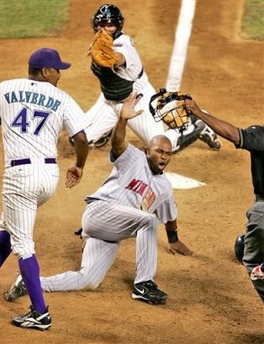June 8, 2005
Comeback in the Desert
I have plenty of thoughts on the Twins' draft, but I might as well wait until they finish up with rounds 19-50 today. Plus, there was a pretty good game last night to talk about today. So, barring some sort of big news between now and then, I'll have a draft wrap-up tomorrow.
Did I ever mention that the Twins are the team that won't die?
As he has been doing all too frequently of late, Brad Radke decided to give the Diamondbacks a four-run head start last night. No matter, that just meant the Twins' bats had to come alive to get Radke off the hook and take a late-inning lead.
Then Juan Rincon picked a bad time to give up his first home run of the season, serving up a three-run shot to Tony Clark that tied the game in the bottom of the eighth inning. No big deal, that just gave the Twins a little extra challenge on the way to their 34th win of the season.
Torii Hunter came up with his second monster game of the month, going 4-for-5 with a pair of solo homers and four runs scored (including the game-winner, pictured below), and Michael Cuddyer snapped out of his slap-hitting rut with a two-run homer and three runs scored.

To Radke's credit, he recovered nicely from yet another disastrous first inning to right the ship and pitch scoreless second, third, and fourth frames, before giving up a solo homer to Luis Gonzalez in the fifth inning. But recovery or not, there is no doubt whatsoever that his ongoing trend of first-inning implosions is very concerning.
Radke has been knocked around to the tune of .368/.373/.772 in the first inning this season, which is bordering on the ridiculous when you consider he has held opponents to a .263 batting average and .390 slugging percentage in innings two through nine. The inability to get through the first inning unscathed is nothing new for Radke, but prior to this season it seemed like something he had gotten over.
Last year, for instance, batters hit .236/.264/.374 off him in the first inning, compared to .267/.290/.393 overall. Of course, if you look beyond last year you see that batters hit .316/.336/.602 in the first inning off Radke in 2003, so if he put the struggles behind him they were only a few feet away. While I wasn't able to locate Radke's career splits by inning, I was able to find his career numbers by pitch.
PITCH AVG ERA IP/HR
1-15 .299 6.83 5.22
16-30 .270 5.26 6.97
31-45 .247 3.74 11.78
46-60 .259 2.90 7.15
61-75 .265 4.20 10.43
76-90 .302 3.88 6.68
91-105 .276 3.11 8.57
I haven't looked at these sorts of numbers for enough pitchers to get a feel for exactly where Radke's overall record stands, but it is certainly obvious that he struggles early in games. The above numbers are from a career spanning 11 years and consisting over 2,000 innings and 300 starts, so it's a pretty huge sample size. In other words, I don't think his early struggles are a fluke.
The most discouraging thing about all of this isn't really how poorly Radke has pitched early in games -- although certainly that is up there on the list -- but rather that no one has figured out a way to fix his problem in 11 years with the Twins. It seems to be coming to a head this season, so perhaps a solution will finally be found. If there is one to be found, that is.
And just so it doesn't seem like Radke is being unfairly singled out, Johan Santana has allowed a .353 batting average (and .706 slugging percentage) in the first inning this season, compared to a .188 batting average afterward. The big difference with Santana is that he held opponents to .226/.285/.391 in the first inning from 2002-2004, making this season's struggles unique and potentially just a small sample-size fluke.
Today at The Hardball Times:
- Draft Notes (by Aaron Gleeman)
- Business of Baseball Report (by Brian Borawski)
Today's Picks (47-41, +$440):
Toronto (Halladay) -150 over Chicago (Mitre)

